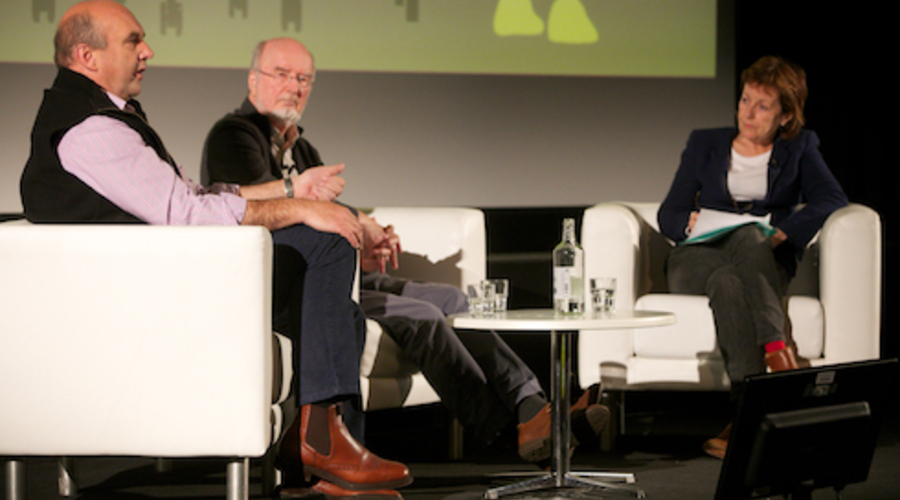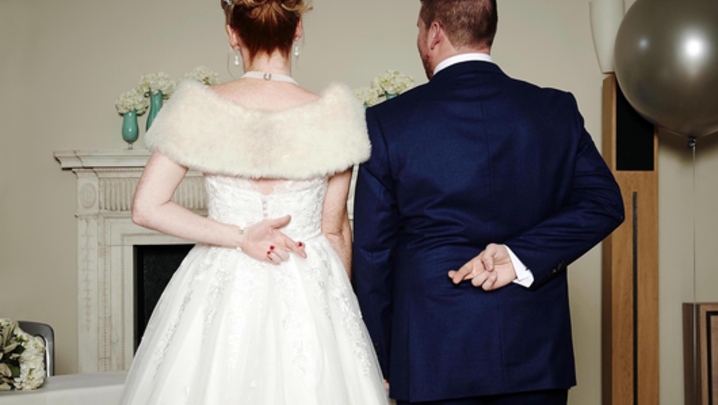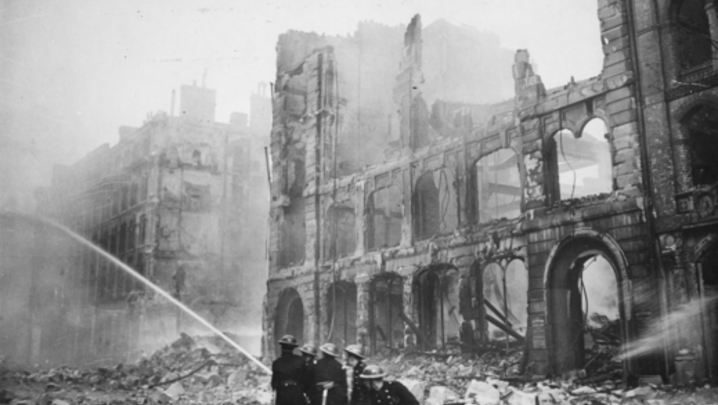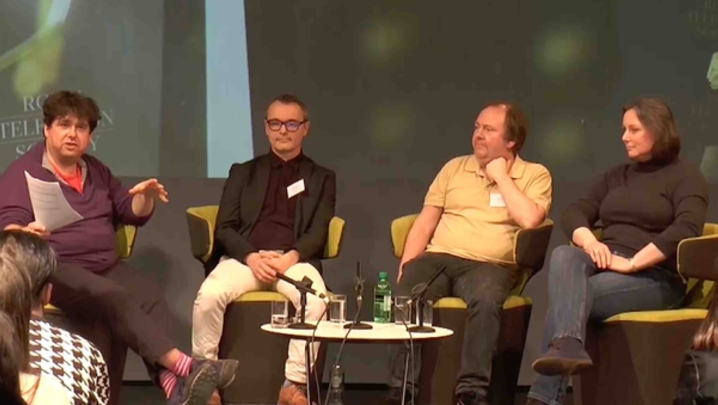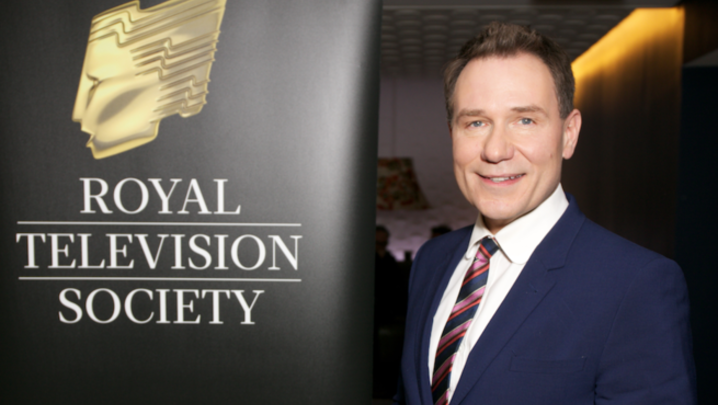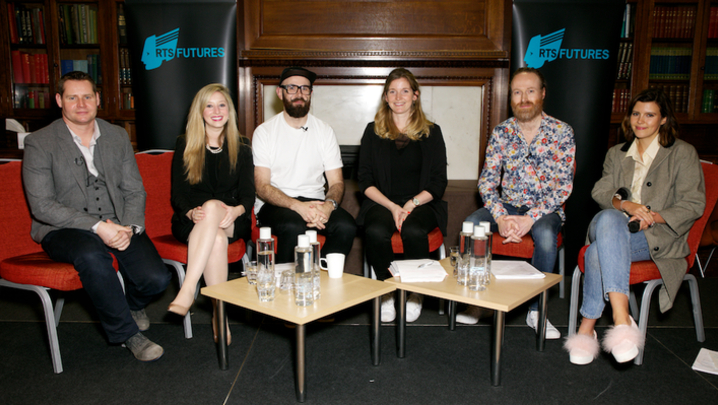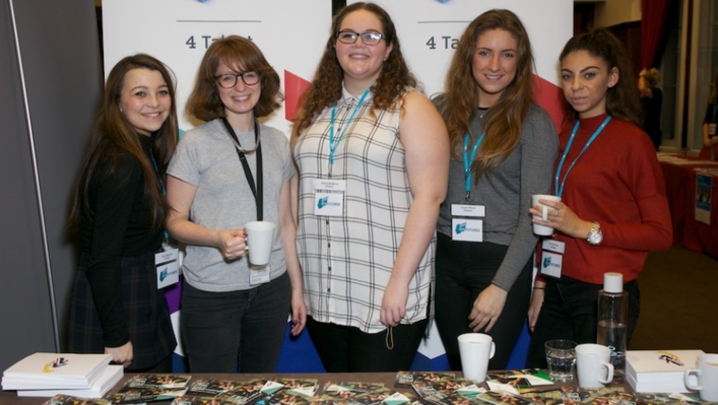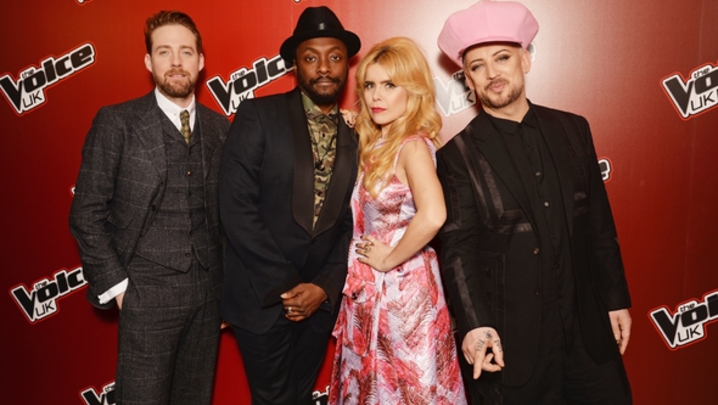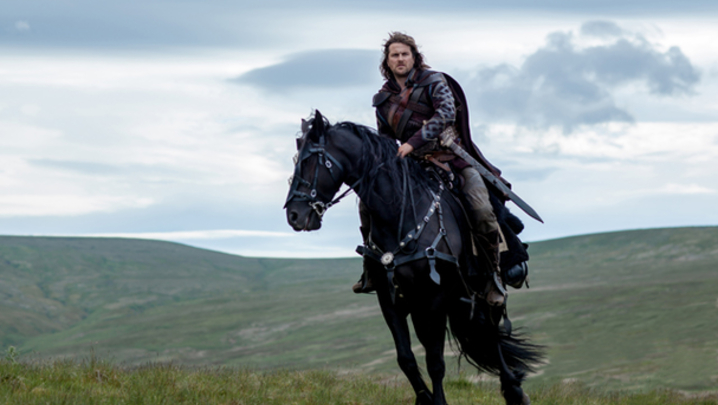TV sound engineers are used to keeping a low profile. Only if something goes amiss do the people responsible for the sound emerge from the shadows. Paradoxically, minus the sound track a TV show would be unwatchable.
This point was made by the two veterans delivering an RTS Craft Skills Masterclass on sound, Chris Ashworth, Production Sound Mixer, and Mike Felton, Sound Designer.
“You only get shouted at when things go wrong,” Felton observed. “Sound is a masochist’s job. Basically you do it for your own satisfaction.”
Chair Carolyn Reynolds pointed out that sound is a job for perfectionists. The two sound supremos seemed to agree but appeared too modest to acknowledge their precise contribution to the success – or otherwise – of a programme.
“Most sound practitioners I know are passionate about what they do,” stressed Ashworth. “You work to your own standards and not necessarily the standards people expect of you.”
Felton is a music specialist. He described what it was like being in charge of the sound for the BBC’s annual Glastonbury binge.
The students were treated to a clip of Lionel Richie performing on the Pyramid Stage at the 2015 festival. The sound appeared flawless.
Reynolds asked what the challenges were of perfecting the sound at Glasto. “Well, it’s only a band and a few audience mikes,” he replied self-effacingly.
“The difficulty is covering nine bands in quick succession with only a 20-30 minute turn round between each one.”
It was necessary to plan ahead. There are no rehearsals so the pressure is on. “You are working on unknown material so it’s seat of the pants. You just launch into it,” Felton said.
“It’s quite a responsibility doing the heritage Sunday afternoon slot (Richie’s showcase in 2015) because it gets the largest turnout. The crowd stretches back into infinity and it’s going out live.”
The Sound Designer said it was important to be alert to the audience’s reaction.
Six stages at Glastonbury are covered by the BBC. From a broadcaster’s perspective this makes it a huge logistical undertaking.
Felton began his career in radio: “At the time TV was the more exciting frontier so I quickly moved into TV. There were only two channels, the BBC and ITV.”
His experience in radio included recording 78rpm acetate discs for three-minute news reports, a universe away from 21st century digital technology.
“One fascinating part of the job is exploring the possibilities today’s technology enables. You can do things that 30 years ago would have seemed like science fiction.”
Ashworth interjected: “It is very much using the technology to improve your performance, rather than being driven by the technology. You make it work for you.”
He revealed how as a 14-year-old he'd started out on mobile discos. Ashworth applied for a BBC job but was rejected.
Undeterred, he went to work in post-production at a West End facilities house. He subsequently joined Thames Television (then the London ITV station) as a location sound specialist.
Since then Ashworth has travelled the world working on TV drama. This year much of his time was spent in Russia employed on BBC2’s new adaptation of War and Peace.
The audience were shown a clip from another BBC2 costume drama, The Day We Sang, written and directed by Victoria Wood.
Ashworth was in charge of the sound for the programme. This was a difficult job because he had to record the two stars (Imelda Staunton and Michael Ball) singing with the Halle Orchestra backed by a choir.
Getting the sound right quickly is key to the job. On this shoot, however, he was given more time than he anticipated.
“I remember it was a cold day in Manchester. Unusually the film crew were hanging around all morning while I did the sound for the orchestra…
“My time often gets squashed down because other problems arise.
“It was unusual to have a whole morning but I still had the first assistant saying to me ‘Are you ready to go yet?’…
“We had to balance the orchestra and turn it round for playback and pre-record the vocal, and try and record it live.
“It was a long, interesting day with its problems. But we achieved what we set out to.”
He added: “There are a lot of elements involved in juggling location sound…We had a finite time to record 12 pieces of music…
“We couldn’t do it as live – with a pair of mikes over the orchestra – but with multiple mike setups and monitors for the conductor.”
Getting work of this kind depended on having the right contacts – provided your level of proficiency was up to scratch.
“I have a reputation for being able to sort out fairly difficult music playback stuff,” he said. “The producer (on The Day We Sang) knew this was going to be tricky.
“The cameraman was someone I’d worked with for 20 years. The job fell into my lap when the local guy wasn’t available.”
He was asked by a one of the students how he managed to maintain a satisfactory work/life-balance while spending weeks away from home.
“The time between jobs is very precious,” Ashworth replied. “You want to be in the situation where you have enough money to get you through the period when you’re not working.”
He advised students considering a career in sound to regard their daily pay as the equivalent of living expenses for two or three days because of the inevitable gaps in working.
“To earn enough for the year, you need 30 or 40 weeks’ work,” he said. “When I first went freelance I aimed to work 42 weeks a year.
“That’s sort of where I settled. I had a couple of years where work dropped off completely.
“That’s tough because rather than enjoying your time off your life becomes a constant search for work.”
Next was a clip from BBC Two’s Later…With Jools Holland. Felton outlined the difficulties of doing the sound for up to six acts in real time (i.e.an hour), all performing in the same studio.
“In contrast to Glastonbury, Later…With Jools Holland is more considered. You have a lot of preparation time. It’s basically a two-day programme,” he said.
“The first day no vision is involved, it’s getting all the bands in, the lighting set up. We are rigging all the bands, sound checking them one at a time…
“Hopefully by then you have got to the stage where you can immediately go to camera rehearsals the following day.”
Each band is camera rehearsed separately. Felton explained how Later required a lot of pre-planning in order to meet deadlines.
He plans everything and mixes the sound for the show. Felton’s assistant runs the infrastructure. He is younger than him and therefore can cope better with higher frequencies as his hearing is sharper.
When dealing with so many acts, surely each one is likely to have strong opinions on how they should sound, probed Reynolds.
“Most of the time I am left to my own devices,” Felton answered. “They’ve probably got confidence in me by now anyway. We’ve been doing the show for 23 years. Sometimes people do come in for a listen and offer their opinion.”
There is a “very consistent family of people who have worked on the show for a long time." This also helped.
Turning to Ashworth, Reynolds asked if the approach on TV drama was totally different to music shows.
He indicated it was, especially on a show featuring a high number of speaking parts like ITV’s Downton Abbey.
“The main issue is managing a large amount of radio mikes (all cast members who have dialogue wear one on Downton) with very limited equipment, and the time pressure,” said Ashworth
“Maggie Smith always wears high necks so you’ve got to have a costume assistant you can trust who can put the mike in a good place. A certain amount of training goes on there,” he added.
The students were shown some unfinished film from War and Peace, shot in St Petersburg earlier this year.
The dance sequence was hot from the cutting room floor. In the scene the music's loudness rendered a lot of the actors’ lines inaudible.
Ashworth said this would be fixed in the edit. “The dialogue will be made brighter…and eventually it will punch through the music,” he explained.
“It was a difficult scene to do. We were in Russia with very limited equipment and it was very hard to get hold of anything else we needed.
“Everything had to come from Moscow, seven hours away. Invariably it had to come with a technician because none of us were capable of using it.”
Throwing the session open to the floor, one of the students asked how sound engineers build good relationships with directors.
“People tend to work with people they feel safe with,” replied Ashworth. “It’s a very vulnerable position for a director. You’ve got your baby and it could be trashed by somebody else.”
He added: “Compromise is always required between all the various disciplines that come together to make TV…Trade-offs need to be made between lighting, camera, sound design. A lot of flexibility is required.”
A student asked Ashworth’s top tip for recording sound for a TV drama.
“Make sure the wanted sound cuts through the unwanted sound,” he said.
Did either of them have any advice for how to handle sound on documentaries? “I cut my teeth on documentaries,” replied Ashworth. “I still use my documentary sound making skills every day…
“You want the mike to be close to the subject and not the camera. Budgets are tight these days so unfortunately sound people don’t often get sent on documentaries…
“The same principles apply. Make sure you are listening and you are not surrounded by noise…Think about the story that is being conveyed. You are all in it together...
“As a sound recordist you don’t demand, you suggest and cajole people into doing the right thing.”
How did Felton feel about a lot of contemporary music being made by electronic machines instead of played on instruments?
“Yes, there is a tendency for some bedroom music makers to use samples…We have bands on Later who use a lot of sampling.
“Technically it causes fewer problems for mixing because you are just getting clean sounds but it is less organic. It is not satisfying musically…
The essentials for those seeking a career in sound
Mike Felton: “Only do it if you’re passionate about sound…It might be worth joining one of the professional organisations.
“They usually have student rates. You can then tap into the knowledge of all the people in that organisation.
“In the old days when people worked in a very big collegiate organisations knowledge was shared.
“Nowadays you might feel alienated as a freelance.”
Chris Ashworth: “Get to know a network of people. Work with as many people as you can.
“Listen to good stuff. Decide what you feel is rubbish and throw it away. Learn from as many people as you can.
“There is a huge element of knowledge out there. In a disparate freelance world it is not always easy to access it.”

